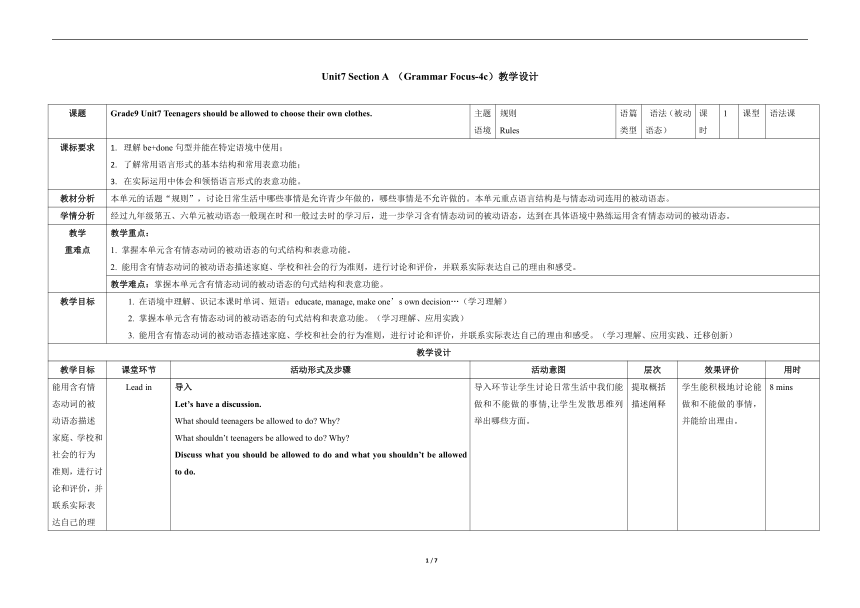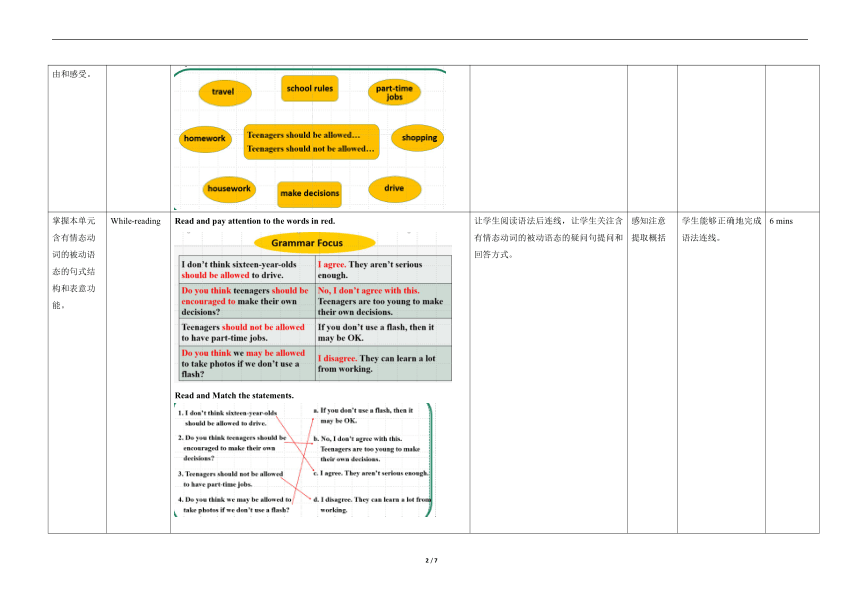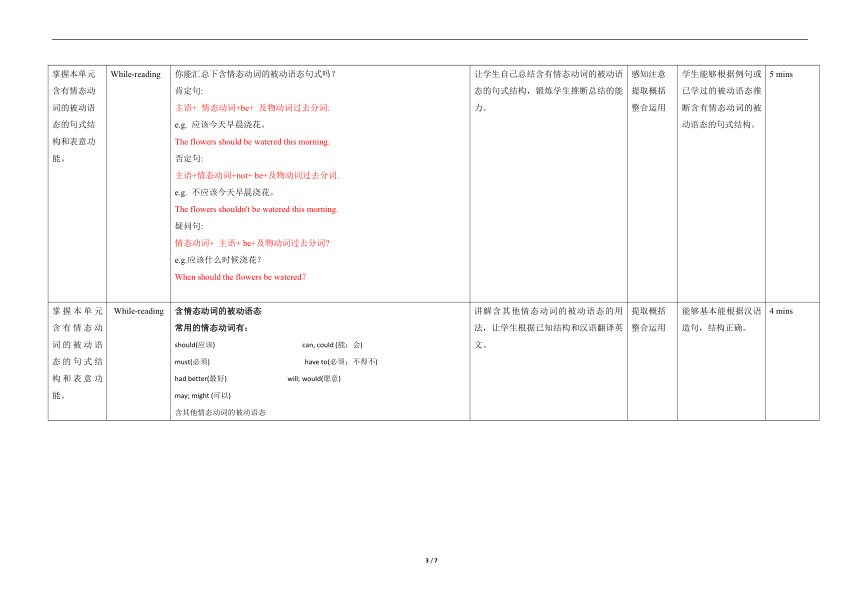Unit7 Teenagers should be allowed to choose their own clothes.Section A (Grammar Focus-4c)教学设计(表格式)
文档属性
| 名称 | Unit7 Teenagers should be allowed to choose their own clothes.Section A (Grammar Focus-4c)教学设计(表格式) |

|
|
| 格式 | docx | ||
| 文件大小 | 320.6KB | ||
| 资源类型 | 教案 | ||
| 版本资源 | 人教新目标(Go for it)版 | ||
| 科目 | 英语 | ||
| 更新时间 | 2024-07-22 13:27:25 | ||
图片预览



文档简介
Unit7 Section A (Grammar Focus-4c)教学设计
课题 Grade9 Unit7 Teenagers should be allowed to choose their own clothes. 主题语境 规则 Rules 语篇类型 语法(被动语态) 课时 1 课型 语法课
课标要求 理解be+done句型并能在特定语境中使用; 了解常用语言形式的基本结构和常用表意功能; 在实际运用中体会和领悟语言形式的表意功能。
教材分析 本单元的话题“规则”,讨论日常生活中哪些事情是允许青少年做的,哪些事情是不允许做的。本单元重点语言结构是与情态动词连用的被动语态。
学情分析 经过九年级第五、六单元被动语态一般现在时和一般过去时的学习后,进一步学习含有情态动词的被动语态,达到在具体语境中熟练运用含有情态动词的被动语态。
教学 重难点 教学重点: 掌握本单元含有情态动词的被动语态的句式结构和表意功能。 能用含有情态动词的被动语态描述家庭、学校和社会的行为准则,进行讨论和评价,并联系实际表达自己的理由和感受。
教学难点:掌握本单元含有情态动词的被动语态的句式结构和表意功能。
教学目标 在语境中理解、识记本课时单词、短语:educate, manage, make one’s own decision…(学习理解) 掌握本单元含有情态动词的被动语态的句式结构和表意功能。(学习理解、应用实践) 能用含有情态动词的被动语态描述家庭、学校和社会的行为准则,进行讨论和评价,并联系实际表达自己的理由和感受。(学习理解、应用实践、迁移创新)
教学设计
教学目标 课堂环节 活动形式及步骤 活动意图 层次 效果评价 用时
能用含有情态动词的被动语态描述家庭、学校和社会的行为准则,进行讨论和评价,并联系实际表达自己的理由和感受。 Lead in 导入 Let’s have a discussion. What should teenagers be allowed to do Why What shouldn’t teenagers be allowed to do Why Discuss what you should be allowed to do and what you shouldn’t be allowed to do. 导入环节让学生讨论日常生活中我们能做和不能做的事情,让学生发散思维列举出哪些方面。 提取概括 描述阐释 学生能积极地讨论能做和不能做的事情,并能给出理由。 8 mins
掌握本单元含有情态动词的被动语态的句式结构和表意功能。 While-reading Read and pay attention to the words in red. Read and Match the statements. 让学生阅读语法后连线,让学生关注含有情态动词的被动语态的疑问句提问和回答方式。 感知注意 提取概括 学生能够正确地完成语法连线。 6 mins
掌握本单元含有情态动词的被动语态的句式结构和表意功能。 While-reading 你能汇总下含情态动词的被动语态句式吗? 肯定句: 主语+ 情态动词+be+ 及物动词过去分词. e.g. 应该今天早晨浇花。 The flowers should be watered this morning. 否定句: 主语+情态动词+not+ be+及物动词过去分词. e.g. 不应该今天早晨浇花。 The flowers shouldn't be watered this morning. 疑问句: 情态动词+ 主语+ be+及物动词过去分词 e.g.应该什么时候浇花? When should the flowers be watered? 让学生自己总结含有情态动词的被动语态的句式结构,锻炼学生推断总结的能力。 感知注意 提取概括 整合运用 学生能够根据例句或已学过的被动语态推断含有情态动词的被动语态的句式结构。 5 mins
掌握本单元含有情态动词的被动语态的句式结构和表意功能。 While-reading 含情态动词的被动语态 常用的情态动词有: should(应该) can, could (能;会) must(必须) have to(必须;不得不) had better(最好) will; would(愿意) may; might (可以) 含其他情态动词的被动语态 讲解含其他情态动词的被动语态的用法,让学生根据已知结构和汉语翻译英文。 提取概括 整合运用 能够基本能根据汉语造句,结构正确。 4 mins
掌握本单元含有情态动词的被动语态的句式结构和表意功能。 While-reading 你能把含情态动词的主动句变成被动语态句式吗? 1. You should finish your homework first. 被动句: Your homework should be finished (by you) first. 2. You can take this magazine home. 被动句: This magazine can be taken home (by you). (一)主语: 将主动语态的宾语变成被动语态的主语。 (二)将含情态动词的主动句式变成被动句式,即: “情态动词+动词原形”变成“情态动词+be+过去分词”。 (三)宾语: 在其后加“by+主动句中的主语(人称代词用宾格)”。by短语也可省略。 让学生把主动句变为被动句,自己掌握规律。 提取概括整合运用 学生能快速正确转换为被动句且能总结规律。 4 mins
掌握本单元含有情态动词的被动语态的句式结构和表意功能。 exercises 4a. Rewrite the sentences according to the example. 1. You must clean your bedroom every day. Your bedroom must be cleaned every day.4. Our parents advised us not to go out alone. 2. Parents should encourage teenagers to do social work for their community. 3. Can Lucy do her homework tomorrow instead 4. Do you think we must keep teenagers away from the Internet 5. Parents should give teenagers chances to make their own decisions. 让学生把句子改为被动语态,让学生练习被动语态句式的运用。 提取概括整合运用 学生能正确地改主动句为被动句。 4 mins
掌握本单元含有情态动词的被动语态的句式结构和表意功能。 exercises 4b. Fill in the blanks with the correct forms of the words in brackets. Should teenagers_________ (ask) to move out when they start working In many Western countries, teenagers ___________ (allow) to move out at eighteen. Their parents believe that they should ___________ (educate) to take care of themselves from a young age. This way, when they _________ (start) working they can manage their own lives. However, in most Asian societies, it is not common for teenagers to _______ (move) out. Chinese parents believe that it is better for children to live with parents who can ______ (take) care of them. But the young should then look after their parents as they get older. That is why many Chinese adults __________ (continue) to live with their parents. 让学生用动词的正确形式填空,考察学生被动语态的运用能力。 提取概括整合运用 学生能正确完成填空。 4 mins
能用含有情态动词的被动语态描述家庭、学校和社会的行为准则,进行讨论和评价,并联系实际表达自己的理由和感受。 exercises 4c. You and your friend are starting an English Club. Make a list of rules about what should and should not be allowed. Sample Dialogue 1 A: Members should be allowed to use dictionaries. B: Yes, but they should only use English-English dictionaries. 让学生列举生活中能做和不能做的事,让学生在生活中练习运用含有情态动词的被动语态。 提取概括整合运用 学生能够列举出生活中常。 5 mins
在语境中理解、识记本课时单词、短语。 exercises 1.(安徽中考)Thanks to the Internet, different kinds of information _____ in a short time. A. can be learned B. has been learned C. can learn D. has learned 2.—It‘s difficult for the children to cross the river to go to school. —I think a bridge _____ over the river. A. was built B.is built C. should build D. should be built 3.(黄冈中考)—How often do I need to feed the dog? —It ______ food every day, or it will be hungry. A. must give B. must be give C. must be given D. must be gave 4.(泸州中考)The dictionary may _____ for three weeks. A. keep B. be kept C. borrow D. be borrowed 5.(贵阳中考)In order to make our city more beautiful, more trees and flowers _______ every year. A. will plant B. should plant C. should be planted 6.(达州中考)—Final exam is coming, Tom. Don’t watch TV for too long. —I'm not a child any more. I ______ what to do. A. should always be told B. should always tell C. shouldn’t always be told D. shouldn’t always tell 让学生完成本课时练习题,考察学生本单元重点词汇掌握情况。 提取概括 学生能够按时且正确地完成本课时练习题。 3 min
在语境中理解、识记本课时单词、短语。 homework 登录优教信使或优教通学生端,完成Unit7 Section A (Grammar Focus-4c )基础达标,Unit7 Section A (Grammar Focus-4c )能力提升训练。 让学生完成本课时练习题,考察学生本单元重点词汇掌握情况。 提取概括 学生能够按时且正确地完成本课时练习题。 1 min
第二课时教学反思
这是一节关于含情态动词的被动语态的语法课。通过本次课堂实践,我作了以下反思:
英语语法课较为枯燥,学生对英语学习缺乏自信心和学习动力。
学生对英语课堂知识掌握不实在,理解不全面,导致学生对所学知识不能准确、灵活运用。
针对以上问题,我打算从以下几个方面进行提高:
在教学设计中要充分为学而教,以学生如何有效获取知识,提高能力为标准来设计教学。重视备课,认真钻研教材和,既要备学生,又要备教法。
多鼓励,少批评。平时做好后进生的补差工作。精选语法练习,熟能生巧,达到举一反三。
2 / 2
课题 Grade9 Unit7 Teenagers should be allowed to choose their own clothes. 主题语境 规则 Rules 语篇类型 语法(被动语态) 课时 1 课型 语法课
课标要求 理解be+done句型并能在特定语境中使用; 了解常用语言形式的基本结构和常用表意功能; 在实际运用中体会和领悟语言形式的表意功能。
教材分析 本单元的话题“规则”,讨论日常生活中哪些事情是允许青少年做的,哪些事情是不允许做的。本单元重点语言结构是与情态动词连用的被动语态。
学情分析 经过九年级第五、六单元被动语态一般现在时和一般过去时的学习后,进一步学习含有情态动词的被动语态,达到在具体语境中熟练运用含有情态动词的被动语态。
教学 重难点 教学重点: 掌握本单元含有情态动词的被动语态的句式结构和表意功能。 能用含有情态动词的被动语态描述家庭、学校和社会的行为准则,进行讨论和评价,并联系实际表达自己的理由和感受。
教学难点:掌握本单元含有情态动词的被动语态的句式结构和表意功能。
教学目标 在语境中理解、识记本课时单词、短语:educate, manage, make one’s own decision…(学习理解) 掌握本单元含有情态动词的被动语态的句式结构和表意功能。(学习理解、应用实践) 能用含有情态动词的被动语态描述家庭、学校和社会的行为准则,进行讨论和评价,并联系实际表达自己的理由和感受。(学习理解、应用实践、迁移创新)
教学设计
教学目标 课堂环节 活动形式及步骤 活动意图 层次 效果评价 用时
能用含有情态动词的被动语态描述家庭、学校和社会的行为准则,进行讨论和评价,并联系实际表达自己的理由和感受。 Lead in 导入 Let’s have a discussion. What should teenagers be allowed to do Why What shouldn’t teenagers be allowed to do Why Discuss what you should be allowed to do and what you shouldn’t be allowed to do. 导入环节让学生讨论日常生活中我们能做和不能做的事情,让学生发散思维列举出哪些方面。 提取概括 描述阐释 学生能积极地讨论能做和不能做的事情,并能给出理由。 8 mins
掌握本单元含有情态动词的被动语态的句式结构和表意功能。 While-reading Read and pay attention to the words in red. Read and Match the statements. 让学生阅读语法后连线,让学生关注含有情态动词的被动语态的疑问句提问和回答方式。 感知注意 提取概括 学生能够正确地完成语法连线。 6 mins
掌握本单元含有情态动词的被动语态的句式结构和表意功能。 While-reading 你能汇总下含情态动词的被动语态句式吗? 肯定句: 主语+ 情态动词+be+ 及物动词过去分词. e.g. 应该今天早晨浇花。 The flowers should be watered this morning. 否定句: 主语+情态动词+not+ be+及物动词过去分词. e.g. 不应该今天早晨浇花。 The flowers shouldn't be watered this morning. 疑问句: 情态动词+ 主语+ be+及物动词过去分词 e.g.应该什么时候浇花? When should the flowers be watered? 让学生自己总结含有情态动词的被动语态的句式结构,锻炼学生推断总结的能力。 感知注意 提取概括 整合运用 学生能够根据例句或已学过的被动语态推断含有情态动词的被动语态的句式结构。 5 mins
掌握本单元含有情态动词的被动语态的句式结构和表意功能。 While-reading 含情态动词的被动语态 常用的情态动词有: should(应该) can, could (能;会) must(必须) have to(必须;不得不) had better(最好) will; would(愿意) may; might (可以) 含其他情态动词的被动语态 讲解含其他情态动词的被动语态的用法,让学生根据已知结构和汉语翻译英文。 提取概括 整合运用 能够基本能根据汉语造句,结构正确。 4 mins
掌握本单元含有情态动词的被动语态的句式结构和表意功能。 While-reading 你能把含情态动词的主动句变成被动语态句式吗? 1. You should finish your homework first. 被动句: Your homework should be finished (by you) first. 2. You can take this magazine home. 被动句: This magazine can be taken home (by you). (一)主语: 将主动语态的宾语变成被动语态的主语。 (二)将含情态动词的主动句式变成被动句式,即: “情态动词+动词原形”变成“情态动词+be+过去分词”。 (三)宾语: 在其后加“by+主动句中的主语(人称代词用宾格)”。by短语也可省略。 让学生把主动句变为被动句,自己掌握规律。 提取概括整合运用 学生能快速正确转换为被动句且能总结规律。 4 mins
掌握本单元含有情态动词的被动语态的句式结构和表意功能。 exercises 4a. Rewrite the sentences according to the example. 1. You must clean your bedroom every day. Your bedroom must be cleaned every day.4. Our parents advised us not to go out alone. 2. Parents should encourage teenagers to do social work for their community. 3. Can Lucy do her homework tomorrow instead 4. Do you think we must keep teenagers away from the Internet 5. Parents should give teenagers chances to make their own decisions. 让学生把句子改为被动语态,让学生练习被动语态句式的运用。 提取概括整合运用 学生能正确地改主动句为被动句。 4 mins
掌握本单元含有情态动词的被动语态的句式结构和表意功能。 exercises 4b. Fill in the blanks with the correct forms of the words in brackets. Should teenagers_________ (ask) to move out when they start working In many Western countries, teenagers ___________ (allow) to move out at eighteen. Their parents believe that they should ___________ (educate) to take care of themselves from a young age. This way, when they _________ (start) working they can manage their own lives. However, in most Asian societies, it is not common for teenagers to _______ (move) out. Chinese parents believe that it is better for children to live with parents who can ______ (take) care of them. But the young should then look after their parents as they get older. That is why many Chinese adults __________ (continue) to live with their parents. 让学生用动词的正确形式填空,考察学生被动语态的运用能力。 提取概括整合运用 学生能正确完成填空。 4 mins
能用含有情态动词的被动语态描述家庭、学校和社会的行为准则,进行讨论和评价,并联系实际表达自己的理由和感受。 exercises 4c. You and your friend are starting an English Club. Make a list of rules about what should and should not be allowed. Sample Dialogue 1 A: Members should be allowed to use dictionaries. B: Yes, but they should only use English-English dictionaries. 让学生列举生活中能做和不能做的事,让学生在生活中练习运用含有情态动词的被动语态。 提取概括整合运用 学生能够列举出生活中常。 5 mins
在语境中理解、识记本课时单词、短语。 exercises 1.(安徽中考)Thanks to the Internet, different kinds of information _____ in a short time. A. can be learned B. has been learned C. can learn D. has learned 2.—It‘s difficult for the children to cross the river to go to school. —I think a bridge _____ over the river. A. was built B.is built C. should build D. should be built 3.(黄冈中考)—How often do I need to feed the dog? —It ______ food every day, or it will be hungry. A. must give B. must be give C. must be given D. must be gave 4.(泸州中考)The dictionary may _____ for three weeks. A. keep B. be kept C. borrow D. be borrowed 5.(贵阳中考)In order to make our city more beautiful, more trees and flowers _______ every year. A. will plant B. should plant C. should be planted 6.(达州中考)—Final exam is coming, Tom. Don’t watch TV for too long. —I'm not a child any more. I ______ what to do. A. should always be told B. should always tell C. shouldn’t always be told D. shouldn’t always tell 让学生完成本课时练习题,考察学生本单元重点词汇掌握情况。 提取概括 学生能够按时且正确地完成本课时练习题。 3 min
在语境中理解、识记本课时单词、短语。 homework 登录优教信使或优教通学生端,完成Unit7 Section A (Grammar Focus-4c )基础达标,Unit7 Section A (Grammar Focus-4c )能力提升训练。 让学生完成本课时练习题,考察学生本单元重点词汇掌握情况。 提取概括 学生能够按时且正确地完成本课时练习题。 1 min
第二课时教学反思
这是一节关于含情态动词的被动语态的语法课。通过本次课堂实践,我作了以下反思:
英语语法课较为枯燥,学生对英语学习缺乏自信心和学习动力。
学生对英语课堂知识掌握不实在,理解不全面,导致学生对所学知识不能准确、灵活运用。
针对以上问题,我打算从以下几个方面进行提高:
在教学设计中要充分为学而教,以学生如何有效获取知识,提高能力为标准来设计教学。重视备课,认真钻研教材和,既要备学生,又要备教法。
多鼓励,少批评。平时做好后进生的补差工作。精选语法练习,熟能生巧,达到举一反三。
2 / 2
同课章节目录
- Unit 1 How can we become good learners.
- Section A
- Section B
- Unit 2 I think that mooncakes are delicious!
- Section A
- Section B
- Unit 3 Could you please tell me where the restroom
- Section A
- Section B
- Unit 4 I used to be afraid of the dark.
- Section A
- Section B
- Unit 5 What are the shirts made of?
- Section A
- Section B
- Review of Units 1-5
- Unit 6 When was it invented?
- Section A
- Section B
- Unit 7 Teenagers should be allowed to choose their
- Section A
- Section B
- Unit 8 It must belong to Carla.
- Section A
- Section B
- Unit 9 I like music that I can dance to.
- Section A
- Section B
- Unit 10 You're supposed to shake hands.
- Section A
- Section B
- Review of Units 6-10
- Unit 11 Sad movies make me cry.
- Section A
- Section B
- Unit 12 Life is full of the unexpected
- Section A
- Section B
- Unit 13 We're trying to save the earth!
- Section A
- Section B
- Unit 14 I remember meeting all of you in Grade 7.
- Section A
- Section B
- Review of Units 11-14
